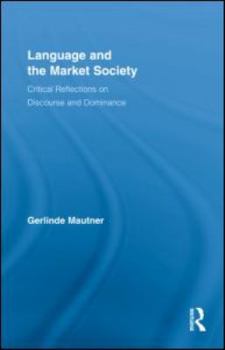Language and the Market Society: Critical Reflections on Discourse and Dominance
Language plays a central role in creating and sustaining the market society-a society, that is, in which market exchange is no longer simply a process, but an all-encompassing social principle. The social domains affected include education, politics and religion. Around the world, government departments have re-defined themselves as service providers; universities produce graduates; job seekers are asked to package themselves more effectively, and there are consultants specializing in church marketing. And as individuals, too, we are supposed to brand ourselves, sell ourselves and strategically manage our personal relationships. Through an intricate dialectic, such patterns of linguistic choices reinforce the social structures that shape them, further consolidating the marketization process. Marketization thus emerges as a globally unfolding process in which language holds a key position as both cause and effect, and as both subject and object. The book examines these phenomena from a linguistic and critical perspective, drawing on critical discourse analysis, sociological treatises of market society, and critical management studies.
Related Subjects
Language Arts




